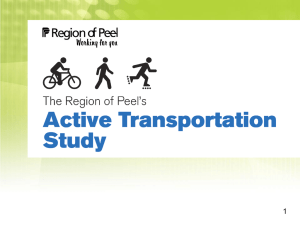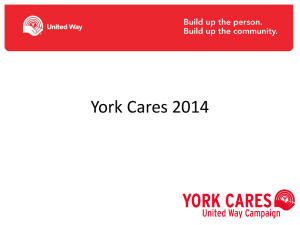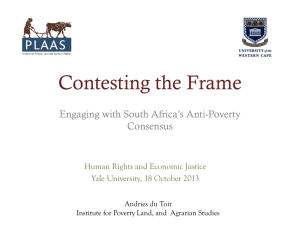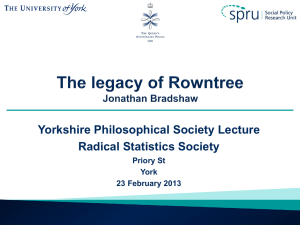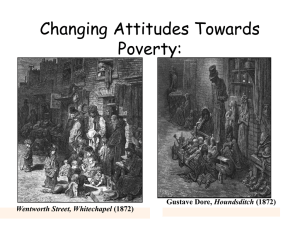Sample Responses to Poverty in Peel - CITY
advertisement
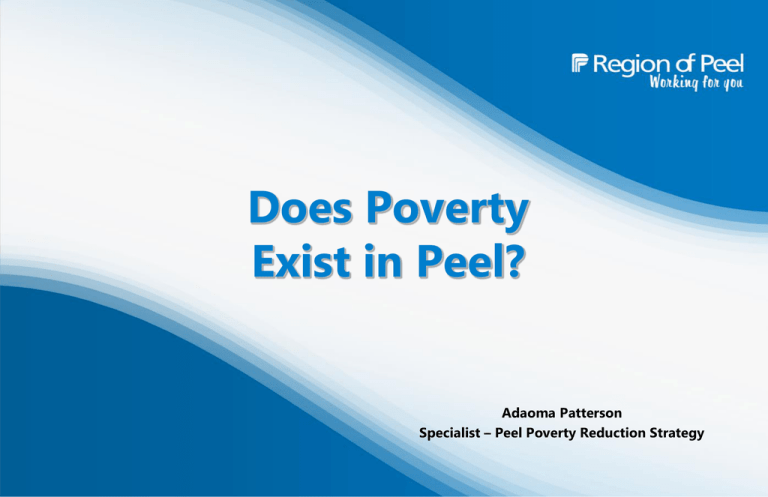
Does Poverty Exist in Peel? Adaoma Patterson Specialist – Peel Poverty Reduction Strategy The Short Answer is Yes Today’s presentation will address: 1. Peel’s population – growth, immigrants, income 2. Peel’s low-income population – who is most vulnerable 3. The Peel Poverty Reduction Strategy Committee 4. Peel’s first poverty reduction strategy 5. Feedback on the issues Peel’s Population Peel’s Population Peel’s Growth vs Other Regions Population Percentage Change 2001 - 2006 Immigrant Population 2006 – percentage of total population by Census Tract Recent Immigrants Population by Census Tract - 2006 Average Individual Income – 15 years & over by Census Tract Incidence of Low-income by Dissemination Areas Who is most impacted by poverty? Specific Challenges • • • • • Lack of affordable housing High youth unemployment rate Rapid population growth Outdated provincial funding formulas Municipal governments doing more Peel Poverty Reduction Strategy Committee “No single idea is the silver bullet that will end poverty” What is the Peel Poverty Reduction Strategy Committee? The Peel Poverty Reduction Strategy Committee was formed in response to the Province of Ontario’s announcement about the creation of a province wide poverty reduction strategy and to growing and critical issue of poverty in Peel. Co-chaired by United Way of Peel Region and the Region of Peel, the Committee is addressing the growing and critical issue of poverty in Peel and has aligned its work with the Ontario Poverty Reduction Strategy, Breaking the Cycle and is building on the Region of Peel’s 2005 Strategic Review of Poverty to create a regional strategy that addresses the root causes of poverty in Peel. Partners include: •905 Interfaith Coalition •Brampton-Mississauga District Labour Council •Caledon Community Services •City of Brampton •City of Mississauga •Regional Councillor Allan Thompson •Success by 6 Peel •United Way of Peel Region •Fair Share Peel •Mississauga Community Legal Clinic •Peel District School Board •Peel Newcomer Strategy Group •Peel Poverty Action Group •Region of Peel •Social Planning Council of Peel History 2005 Strategic Review of Poverty •Advocacy with senior levels of government •Collaborate on new social and labour market programs •Joint supports for neighbourhood capacity building Regional Council directed staff to engage with community organizations to develop an action plan to mitigate the impact and reduce rate of poverty in Peel •Report back with recommendations in 2006 2005 - 2008 Initiatives that Impact Poverty Since the Review, these initiatives have begun: •Community Investment Strategy •Families First •The Peel Regional Task Force on Homelessness •Neighbourhood Capacity Support Strategy •Peel Newcomer Strategy Group •Peel Youth Violence Prevention Strategy •Regional Diversity Roundtable •Success by 6 Peel •Peel Children and Youth Initiative •211 2007 Provincial Focus on Poverty Provincial government announces Minister of Children & Youth Deb Matthews will be taking the lead to develop a comprehensive child provincial poverty reduction strategy 2008 Peel Provincial Poverty Strategy Committee United Way Peel Region & Region of Peel created this committee to ensure Peel’s voice was included in the provincial consultations and decisions about investments Initial focus included: •Respond to issues related to poverty in Peel •Present and respond to the provincial and federal governments’ consultations and recommendations •Engage the community to get input on ways of reducing poverty in Peel •Ensure poverty remains on the political agenda Campaigns Sample Responses to Poverty in Peel Community Investment Strategy Neighbourhood Strategies Families First Peel Poverty Reduction Strategy Peel Children & Youth Initiative Peel Newcomer Strategy Group Affordable Housing Chapelview & Peel Youth Village Working Towards a Peel Wide Poverty Reduction Strategy Launch Strategy May 2012 Create opportunities to engage nontraditional partners: Boards of Trade, Unions, SME’s, corporations & people living in poverty Map & align with other strategic initiatives: •Peel Children & Youth Initiative •Peel Newcomer Strategy Group •Long-term Housing & Homelessness Strategy, Economic Opportunities Defining the problem: • Income disparities – widening gap between the top and bottom earners • Unequal opportunities – a large pool of skilled people who are unemployed or underemployed, and in particular skilled immigrants • Changing nature of work - increase in lower paying service jobs that provide limited opportunities for higher earnings, job security and benefits • Skills mismatch - many employers indicate that they struggle to find employees that have the skills required for their businesses, yet there is a large pool of unemployed/underemployed skilled workers What does prosperity look like: • All Peel residents working full-time full year have sufficient income to meet their needs • Peel residents are able to secure good quality jobs that pay a reasonable wage • Employers are thriving and contributing positively to our community • Residents have sufficient incomes to support local businesses Actions: • Work with relevant stakeholders to create awareness about the impact of precarious employment on Peel residents and the community. • Develop a business case for addressing poverty in Peel. • Develop an initiative that connects families and individuals experiencing low-income to tax credits and programs for which they are eligible. (Make Tax Time Pay model) Income Security – OW, ODSP, EI Defining the problem: • Inadequate supports - for those outside of the labour market/labour force, help to move forward and achieve goals is often limited • Siloed - systems do no align and support people in moving from one to the other • A last resort – social assistance requires people to exhaust all of their savings and some assets in order to qualify • Complex - rules are complicated and various program rules often conflict • Disincentives & barriers - the current systems are punitive and do not provide incentives for transitioning to work. What does prosperity look like: • A seamless connected system that supports people in time of need, treats people with dignity and respect. • Income support programs that provide Peel residents with adequate supports and opportunities to participate in their communities. Actions: • Ensure Peel’s perspective is included in the provincial review of social assistance and advocate for changes that result in the vision. • Create a roundtable that engages Peel’s business community in the discussion and solutions. • Develop a guide that helps people understand benefits and requirements of all income security programs. • Encourage local income security systems to convene a table aimed at increased communication, improved client service and providing more seamless service. Affordable & Accessible Transit Defining the issue: • Limited regional transit – inter/intra transit connections within Peel and GTA are limited • High cost – continued increase in fares makes transit an expensive option for people living in poverty • Unavailable - no public transit system in Caledon • Limited subsidies - subsidies currently exist only for seniors and students; youth not in school, the working poor are not eligible for the subsidy • Limited access - eligibility restrictions to existing accessible programs (i.e. TransHelp) What does prosperity look like: • Transit systems that enable people to move around Peel and the GTA in an efficient and affordable manner Actions: • Convene a transit working group with area municipalities to develop affordable transit programs. • Partner with local grocer to create a free or discounted pick-up & drop-off program to their store Food Security Defining the problem: • Inaccessible - high and increasing cost of healthy food • Unequal – inconsistent supply and quality at food banks across the Region • Expanded definition – need to increase community/public space for food production What does prosperity look like: • A region where everyone, at all times, has physical and economic access to sufficient, safe and nutritious food to meet their dietary needs and food preferences for an active and healthy life. Actions: • Work with partners to increase the number of breakfast & food programs in schools. • Promote partnerships and programs that support rural-urban food links and the availability of locally grown, healthy foods through the Farmer’s Market and other rural-urban initiatives. • Create a Peel food charter that articulates Peel’s commitment to creating a community with sufficient access to food. • Work with partners to increase the number of affordable farmers markets in Peel. “Anyone who is working should not go home (at the end of the day) and still be living in poverty…100 years ago, we decided as a society that we did not want kids working in our factories; we made a values decision and the economic system did not crash…for too long we’ve allowed our economics to drive our values – our values should drive our economics.” Mark Chamberlain, President President Trivaris Ltd., and former Chair of the Hamilton Roundtable on Poverty Reduction 24 References • Louay Eskandar, GIS Mapping Specialist, ROP • Andre Lyn, Researcher, Social Planning Council of Peel • Simon Black, York University Web-sites • http://unitedwaypeel.org/pics/2011/materials/Portaits-of-Peel-2011.pdf • www.peelcounts.ca • www.unitedwaypeel.org/poverty • www.peelregion.ca Investing for Resilience

